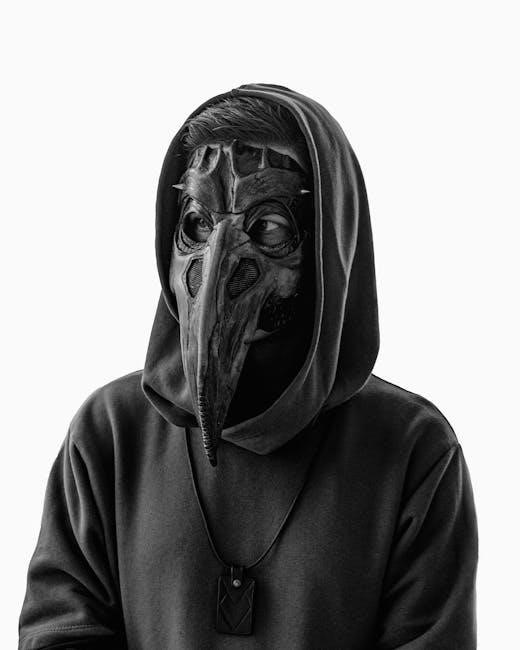Albert Camus’s The Plague (1947) is a profound exploration of human resilience and ethics amidst crisis. The novel delves into themes of suffering, solidarity, and the search for meaning in a chaotic world. Its universal relevance continues to resonate, making the PDF version a sought-after resource for understanding Camus’s philosophy and literary genius.

1.1 Overview of the Novel
The Plague, written by Albert Camus in 1947, is a gripping narrative set in the fictional city of Oran, where a deadly plague outbreak disrupts the lives of its inhabitants. The novel follows Dr. Bernard Rieux, a physician who becomes a central figure in the fight against the epidemic, and explores themes of human suffering, solidarity, and resilience. Through vivid descriptions and philosophical reflections, Camus examines how individuals and society respond to crisis, revealing the duality of human nature. The story’s timeless relevance has made it a classic of 20th-century literature, with the PDF version offering easy access to this profound work.
1.2 Historical Context and Background
The Plague, written by Albert Camus in 1947, is deeply rooted in the post-World War II era, reflecting the existential crises and moral dilemmas of the time. The novel draws parallels to the French Resistance and the Nazi occupation, with the plague serving as a metaphor for oppression and collective suffering. Camus’s experiences during WWII influenced his portrayal of resilience and solidarity in the face of adversity. The PDF version of the novel highlights these historical undertones, offering readers a glimpse into the societal and philosophical backdrop that shaped Camus’s masterpiece. Its themes remain timeless, resonating with modern readers.

1.3 Key Themes and Messages
Albert Camus’s The Plague explores profound themes of absurdism, resilience, and moral responsibility. The novel highlights the human condition’s fragility, emphasizing solidarity and collective action in the face of suffering. Camus uses the plague as a metaphor for existential crises, urging individuals to find meaning amidst chaos. The PDF version underscores these themes, illustrating how societal unity and ethical choices are vital during adversity. Camus’s philosophy of absurdism is central, advocating for acceptance of life’s unpredictability while striving to act with dignity and compassion, even in the darkest times.

The Plague in PDF Format
The Plague by Albert Camus is widely available in PDF format, offering a convenient and accessible way to explore its profound themes and philosophical insights.

2.1 Availability and Sources for Download
Albert Camus’s The Plague is widely available in PDF format from various online sources, including academic databases, eBook platforms, and literary archives. Many websites offer free downloads, while others provide paid versions with enhanced features. Popular sources include Google Books, Project Gutenberg, and online libraries. Additionally, several educational institutions and forums share excerpts or full texts for research purposes. However, always ensure the source is legal and reputable to avoid copyright issues. The PDF format allows readers to access the novel conveniently, making it a popular choice for students and enthusiasts of Camus’s work.
2.2 Structure and Content of the PDF
The PDF version of The Plague typically includes the full text of Camus’s novel, divided into five parts that chronicle the outbreak and its impact on the city of Oran. The narrative is enriched with philosophical reflections and moral dilemmas, offering insights into human behavior during crises. Many PDF editions retain the original structure, including dialogues, descriptions, and thematic elements. Some versions may also include prefaces, analyses, or study guides to enhance comprehension. The digital format ensures clarity and readability, making it easier for readers to engage with Camus’s profound exploration of suffering and solidarity.
2.3 Advantages of Reading the PDF Version
Reading The Plague in PDF format offers several advantages, including portability and accessibility across devices. The digital version allows users to easily search for specific passages, highlight text, and annotate, enhancing study and analysis. PDFs are often cost-effective and environmentally friendly compared to physical copies. Additionally, the ability to adjust font size and brightness ensures a comfortable reading experience. Many PDF editions are also free or low-cost, making Camus’s timeless philosophical insights more widely accessible to a global audience. These features make the PDF a convenient and practical choice for modern readers.

Albert Camus and His Philosophy
Albert Camus, a French philosopher and novelist, explored absurdism, emphasizing human resilience and morality in a indifferent universe. His works, like The Plague, reflect his belief in solidarity and the search for meaning, resonating timeless themes in the PDF version of his seminal novel.
3;1 Biography of Albert Camus
Albert Camus was born on November 7, 1913, in Dréan, Algeria, to a working-class family. His father, Lucien, died in World War I when Camus was just one year old. He grew up in poverty, relying on scholarships to pursue his education. Camus developed a passion for philosophy and literature, which shaped his career as a writer and thinker. He contracted tuberculosis in his teens, a condition that influenced his worldview. Camus became a prominent figure in existentialist and absurdist philosophy, advocating for morality and resilience in an indifferent world. His life was marked by political activism and a commitment to human dignity until his tragic death in a car accident in 1960 at the age of 46.
3.2 Camus’s Philosophical Views in The Plague
In The Plague, Camus explores his philosophical views through the lens of an epidemic ravaging the city of Oran. Central to the novel is the concept of the “absurd,” where humanity confronts a meaningless and indifferent universe. Camus argues that suffering is inherent to life, yet it is through collective solidarity and ethical responsibility that individuals find purpose. The novel rejects religious or ideological justifications for suffering, instead emphasizing human resilience and moral action in the face of adversity. Camus’s philosophy in the novel underscores the importance of empathy, dignity, and resistance, even in the darkest times. This reflection of his broader absurdist philosophy provides a powerful commentary on the human condition. The characters’ struggles and choices illustrate Camus’s belief that true meaning is found in the fight against absurdity, not in its resolution.
3.3 The Plague as a Reflection of Camus’s Absurdism

The Plague serves as a profound reflection of Camus’s absurdist philosophy, which posits that the universe is indifferent to human existence. The novel illustrates the absurd through the arbitrary and meaningless suffering caused by the plague, challenging religious and moral explanations for such events. Camus’s characters, like Dr. Rieux, embody the absurdist response: not seeking false hope or divine justification but instead engaging in relentless, ethical action. The novel highlights the futility of seeking ultimate meaning in a chaotic world, yet affirms the human spirit’s capacity for resilience, solidarity, and dignity in the face of absurdity. This duality of despair and defiance defines Camus’s absurdist vision, resonating deeply with readers.
Themes and Symbolism in The Plague
The Plague explores themes of suffering, solidarity, and existential struggle. The plague itself symbolizes the absurdity of human existence, highlighting the tension between individual and collective suffering. The novel reflects Camus’s exploration of resilience and morality in the face of meaningless chaos, resonating deeply with readers seeking universal truths.
4.1 The Concept of Suffering and Solidarity
In The Plague, suffering is portrayed as a universal human experience that transcends individual fate. The novel highlights how collective suffering fosters solidarity, as the community unites to combat the plague. Through characters like Dr. Rieux and Tarrou, Camus illustrates that true solidarity is not driven by personal gain but by a shared commitment to alleviate others’ pain. The plague serves as a catalyst, revealing the resilience of the human spirit and the moral imperative to act selflessly in the face of adversity. This theme underscores Camus’s belief in the power of collective action to counter existential despair.
4.2 The Role of Medicine and Science in the Novel
In The Plague, medicine and science are portrayed as vital yet imperfect tools against the outbreak. Dr. Rieux’s tireless efforts to treat the sick and develop a serum exemplify the dedication of medical professionals. However, the novel critiques the limitations of science when faced with uncontrollable natural forces. Despite the doctors’ commitment, the plague’s persistence underscores the fragility of human knowledge and the futility of scientific endeavors in the face of existential chaos. Camus uses this tension to explore the boundaries of human control and the inevitability of suffering, highlighting the moral and ethical dilemmas inherent in such crises.
4.3 Symbolism of the Plague Itself
The plague in Camus’s novel serves as a multifaceted symbol, representing both a literal and metaphorical force of destruction. It embodies the absurdity of existence, highlighting humanity’s vulnerability to uncontrollable events. The plague also symbolizes collective guilt and societal breakdown, as it strips away moral and ethical structures, revealing raw human nature. Furthermore, it acts as a universal leveller, affecting all regardless of status, underscoring the indifference of the universe to human suffering. Through this symbolism, Camus explores themes of existentialism and the search for meaning in a seemingly meaningless world, resonating deeply with readers seeking philosophical insight.

Relevance of The Plague in Modern Times
Albert Camus’s The Plague remains strikingly relevant today, offering timeless lessons on resilience, solidarity, and humanity’s response to crises like pandemics. Its themes resonate deeply in modern society.
5.1 The Plague and the COVID-19 Pandemic

Albert Camus’s The Plague saw a resurgence in relevance during the COVID-19 pandemic, as readers drew parallels between the novel’s themes and the global crisis. The novel’s depiction of societal disruption, isolation, and collective fear resonated deeply with experiences during the pandemic. Both events highlighted the fragility of human life and the importance of solidarity in the face of adversity. The PDF version of The Plague became a key resource for understanding these parallels, offering insights into human resilience and the search for meaning amidst suffering.
5.2 Universal Lessons from the Novel
The Plague by Albert Camus offers timeless lessons on human nature, ethics, and resilience. The novel emphasizes the importance of solidarity and collective action in overcoming adversity. It highlights the need for empathy and compassion, even in the face of suffering. The PDF version of the novel serves as a powerful reminder of the universal human experience, encouraging readers to reflect on their own moral responsibilities. These lessons transcend time, making The Plague a enduring source of wisdom for understanding both individual and societal challenges.
5.3 The Plague’s Enduring Popularity
The Plague remains a timeless classic due to its universal themes and relevance to modern crises, such as the COVID-19 pandemic. The PDF version of the novel has seen a surge in downloads, reflecting its enduring appeal. Camus’s exploration of human resilience, solidarity, and ethical dilemmas resonates across generations. Its ability to mirror real-world struggles, like isolation and collective suffering, ensures its popularity. The PDF format makes the novel accessible, allowing readers to delve into its profound insights on humanity’s capacity to endure and overcome adversity, solidifying its place as a vital read in uncertain times.
